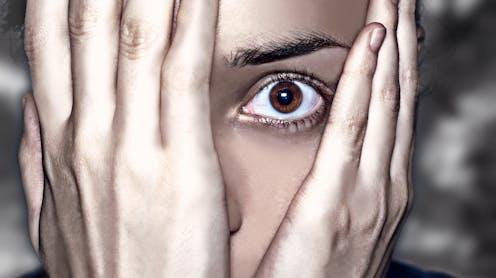Detta inlägg post publicerades ursprungligen på denna sida this site ;
Date:
Author: Rebecca Ellis, Assistant researcher in Public Health, Swansea University
Original article: https://theconversation.com/misokinesia-when-repetitive-movements-are-infuriating-to-some-people-252056

For some people, the mere sight of someone tapping their foot, twirling their hair or clicking a pen can trigger an intense sense of discomfort, or even rage. This reaction is known as “misokinesia”, a sensitivity to repetitive movements that can make everyday interactions challenging.
It is only a recently explored phenomenon in research. But studies suggest that up to one-third of the population experiences some level of discomfort when confronted with the repetitive movements of other people. These triggers can include things such as another person bounding their leg repeatedly, or biting their nails, fidgeting – even yawning. Misokinesia may affect a person’s job and their personal lives.
Misokinesia produces what has been likened by some as a “fight or flight” response in people living with the condition, with reactions including an increase in blood pressure, adrenaline and heart palpitations. Other physical reactions such as nausea are possible too.
There can also be cognitive reactions, such as a lack of focus or patience, negative or violent thoughts, and feelings of anger and disgust.
It can be person-specific. This means that people who experience misokenisia find some people’s repetitive actions are more triggering than others. This can make it difficult to spend time with particular people comfortably due to their opposing needs. For example, it may be difficult for a person with misokinesia to be around someone who is stimming (employing self-stimulating behaviour such as leg bouncing) for emotional regulation.
Misophonia
Misokinesia is similar to misophonia, which is a strong dislike or hatred of certain sounds, often made by people, such as yawning, breathing or chewing. It can also be person-specific and can affect a person’s day-to-day life, including their ability to regulate their emotions.
Misophonia often co-occurs with anxiety, depression, obsessive-compulsive disorder (OCD), post-traumatic stress disorder (PTSD) and attention deficit hyperactivity disorder (ADHD).
Misokinesia, however, is entirely visual. While the two conditions can co-occur, they are distinct experiences.
Given that some people with misophonia report experiencing misokinesia too, it suggests a possible shared neurological basis. But research into both conditions remains in its early stages.
The exact causes of misokinesia remain unclear, but it may be due to a combination of neurological, psychological and genetic factors. There is evidence that neurodivergent people, including autistic people and those with ADHD, may be more likely to experience both misokinesia and misophonia.
Read more:
Misophonia – when certain sounds drive you crazy
People with both of these conditions may experience stigma, with other people believing they are overreacting. This can affect whether a person who experiences misokinesia will share their experiences with others. It can also reduce the likelihood that they will seek support.
There is no official diagnosis for misokinesia, nor for misophonia. Discussions are ongoing about whether they should be recognised as clinical conditions, however.
Can misokinesia be managed?
Cognitive behavioural therapy (CBT) may be one way to reduce the effects of both misokinesia and misophonia on a person’s life. CBT can help a person identify their triggers, acknowledge their reactions and learn relaxation techniques to practice in real-life scenarios. Practicing relaxation techniques, can help to manage both the physiological and mental responses to a trigger.
Practical strategies, such as subtly blocking one’s view of the movement, shifting focus to another part of the environment, or explaining triggers to those around them may also help reduce distress.
![]()
Rebecca Ellis does not work for, consult, own shares in or receive funding from any company or organisation that would benefit from this article, and has disclosed no relevant affiliations beyond their academic appointment.

